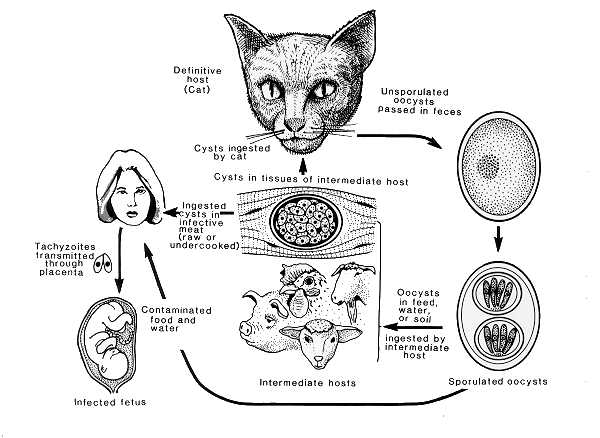Toxoplasma gondii: Difference between revisions
Jump to navigation
Jump to search
imported>Zahava Rubel |
imported>Zahava Rubel |
||
| Line 1: | Line 1: | ||
===Life cycle=== | ===Life cycle=== | ||
[[Image:Fig84 2.JPG|center|Life cycle]] | [[Image:Fig84 2.JPG|center|Life cycle]] | ||
| Line 33: | Line 4: | ||
Much like its close relative plasmodium, toxoplasma gondii has a complex life cycle that alternates between sexual and asexual stages. The various stages of it's life cycle take place in different organisms, cycling between cats and the animals they eat. The cat releases T. gondii oocytes in its feces, which get picked up by ingestion by another animal. Once the oocytes enter this new host they hatch, allowing the parasite to move through the hosts body. | Much like its close relative plasmodium, toxoplasma gondii has a complex life cycle that alternates between sexual and asexual stages. The various stages of it's life cycle take place in different organisms, cycling between cats and the animals they eat. The cat releases T. gondii oocytes in its feces, which get picked up by ingestion by another animal. Once the oocytes enter this new host they hatch, allowing the parasite to move through the hosts body. | ||
Revision as of 08:33, 14 April 2009
Life cycle
Much like its close relative plasmodium, toxoplasma gondii has a complex life cycle that alternates between sexual and asexual stages. The various stages of it's life cycle take place in different organisms, cycling between cats and the animals they eat. The cat releases T. gondii oocytes in its feces, which get picked up by ingestion by another animal. Once the oocytes enter this new host they hatch, allowing the parasite to move through the hosts body.
